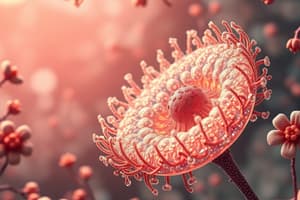Podcast
Questions and Answers
कोण सही है?
कोण सही है?
- एपोप्टोसिस और सेल साइकिल विनियमन: सेल मौत और माइटोसिस के चरणों के माध्यम से प्रगति का नियंत्रण करने वाले तंत्र, जो संवहनात्मक परिवर्तन, विकास और समन्यस्थिति को संभालते हैं। (correct)
- DNA अनुवाद और मरम्मत: जीनेटिक अखंडता को सुरक्षित रखने के लिए आवश्यक तंत्र, जो भिन्नात्मक या परोपकारी कारकों द्वारा हुए नुकसान का सामना करने के दौरान मदद करते हैं।
- कोशिका जैविक: अनुक्रम होने के बीच, अन्य क्षेत्र हैं।
- संदेह क्षेत्र: सेल विज्ञान पर एकत्रित केंद्रीय सिद्धांतों को इनके पुख्ता करने के लिए।
सेल जीनेटिक्स के क्षेत्र में क्या महत्वपूर्ण है?
सेल जीनेटिक्स के क्षेत्र में क्या महत्वपूर्ण है?
- सेल मौत पर प्रभाव
- माइटोसिस के माध्यम से प्रगति का नियंत्रण
- जीनों की संरचना और व्यवहार की प्रक्रिया को सुस्पष्ट करना (correct)
- सेलकला की प्रक्रिया
कौन-कौन से प्रमुख सिद्धांत सेल प्रादेशिकता में शामिल हैं?
कौन-कौन से प्रमुख सिद्धांत सेल प्रादेशिकता में शामिल हैं?
- मुटेशन प्रक्रिया, समुपादन
- मौलिक सेलों की समझ, प्रकल्पन, महत्वपूर्ण प्रक्रियाएं (correct)
- पोपुलेशन गतिकी, प्राकृतिक चुनाव
- कोलेजन, ऊतक, और शरीरी प्रणाली
सेल साइकल में होने वाली प्रक्रिया से Apoptosis में सहायक होती है?
सेल साइकल में होने वाली प्रक्रिया से Apoptosis में सहायक होती है?
Ecology में Population dynamics पर Cell level adaptations का प्रभाव है?
Ecology में Population dynamics पर Cell level adaptations का प्रभाव है?
सेल जीविका के किसे हिस्से में सेमीपरमेबल बैरियर होता है जो सेल के अंदरीक्षीय और बाह्यरूपीय परिवेशों को अलग करता है, जिससे पोषक पदार्थों और कचरे का चयनात्मक परिवहन संभव होता है?
सेल जीविका के किसे हिस्से में सेमीपरमेबल बैरियर होता है जो सेल के अंदरीक्षीय और बाह्यरूपीय परिवेशों को अलग करता है, जिससे पोषक पदार्थों और कचरे का चयनात्मक परिवहन संभव होता है?
कौन सा सेल कोषिकाएं प्रमुख रूप से प्रोटीन संघटन (राइबोसोम), ऊर्जा उत्पादन (मिटोकंड्रिया), डीएनए प्रतिलेखन/प्रतिअनुवाद (नाभि), और गोल्गी तंतु के लिए समर्पित विभाग होते हैं?
कौन सा सेल कोषिकाएं प्रमुख रूप से प्रोटीन संघटन (राइबोसोम), ऊर्जा उत्पादन (मिटोकंड्रिया), डीएनए प्रतिलेखन/प्रतिअनुवाद (नाभि), और गोल्गी तंतु के लिए समर्पित विभाग होते हैं?
किस सेल को कहा जाता है मुख्यत: सेल कार्य के लिए महत्वपूर्ण मैक्रोमोलेक्यूल, संरचनात्मक, कैटलाइक, नियंत्रक, और संकेतन क्षमताएं प्रदान करने में मुख्य भूमिका होती है?
किस सेल को कहा जाता है मुख्यत: सेल कार्य के लिए महत्वपूर्ण मैक्रोमोलेक्यूल, संरचनात्मक, कैटलाइक, नियंत्रक, और संकेतन क्षमताएं प्रदान करने में मुख्य भूमिका होती है?
सेल की मेटाबॉलिज्म प्रक्रियाएं क्या हैं, जिनसे सेल पोषक पदार्थों को ऊर्जा में परिवर्तित करती है और वृद्धि और संचालन के महत्वपूर्ण निर्माण सामग्री पैदा करती है?
सेल की मेटाबॉलिज्म प्रक्रियाएं क्या हैं, जिनसे सेल पोषक पदार्थों को ऊर्जा में परिवर्तित करती है और वृद्धि और संचालन के महत्वपूर्ण निर्माण सामग्री पैदा करती है?
संकेतन नेटवर्क क्या है?
संकेतन नेटवर्क क्या है?
Flashcards are hidden until you start studying
Study Notes
Exploring Life at the Microscale: An Introduction to Cell Biology and General Biology Concepts
Cell biology lies at the heart of understanding living systems because all life forms originate from cells. These tiny units interact and cooperate to construct organisms at every scale—from single-celled microorganisms to multicellular creatures like humans. This overview delves into cell biology while highlighting connections to broader general biology concepts.
Key Features of Cell Biology
At the core of cell biology, we find structures and functions essential for life.
- Cell membrane: A semipermeable barrier separating intracellular and extracellular environments, allowing selective transport of nutrients and waste. Its unique composition enables recognition and communication among cells.
- Organelles: Specialized compartments within cells dedicated to various roles, such as protein synthesis (ribosomes), energy production (mitochondria), DNA transcription/translation (nucleus), and vesicle trafficking (endoplasmic reticulum and Golgi apparatus).
- Proteins: Macromolecules pivotal for cell function, serving structural, catalytic, regulatory, and signaling capacities.
- Metabolism: Processes by which cells convert nutrients into energy and generate building blocks vital to growth and maintenance.
- Signaling networks: Interconnected molecular cascades regulating gene expression, metabolic activity, and cell fate decisions based on environmental cues.
- DNA replication and repair: Essential mechanisms preserving genetic integrity during cell division and responding to damage caused by endogenous or exogenous factors.
- Apoptosis and cell cycle regulation: Mechanisms controlling cell death and progression through the phases of mitosis, enabling tissue turnover, development, and homeostasis.
Connections to Other Disciplines Within Biology
While cell biology focuses on individual cells, other domains link to its central tenets.
- Genetics: Elucidating the structure and behavior of genes, alongside exploring inheritance patterns.
- Physiology: Investigating the functioning of organs, tissues, and body systems utilizing information derived from cellular studies.
- Ecology: Applying population dynamics and evolutionary theories developed from understanding adaptations occurring at the cellular level.
- Evolution: Studying variations in genotypes and phenotypic traits resulting from mutation processes and natural selection within populations of cells.
By elucidating the fundamental aspects of cell biology, researchers have facilitated the deciphering of life's grandest mysteries, pushing forward technological innovation and improving human health and wellbeing.
Studying That Suits You
Use AI to generate personalized quizzes and flashcards to suit your learning preferences.




